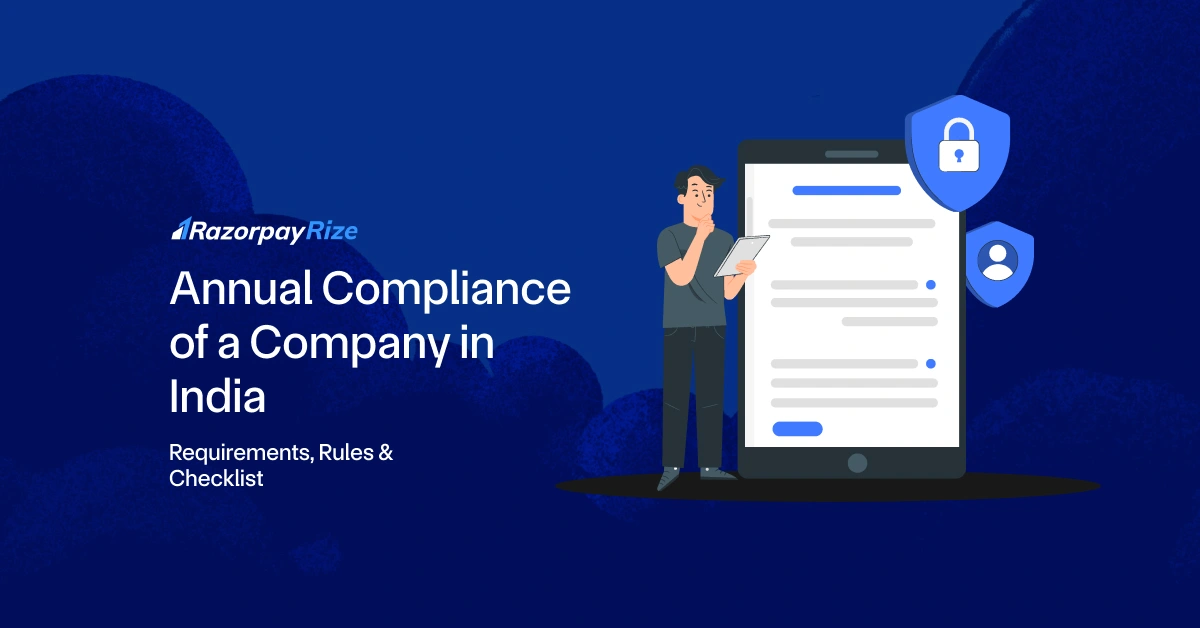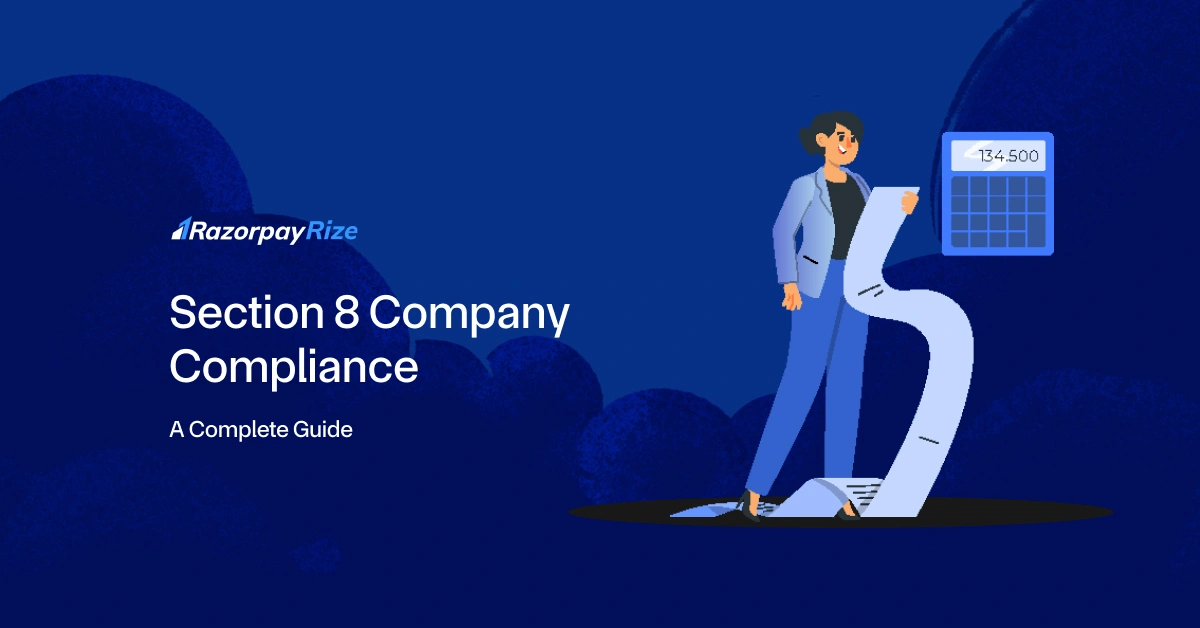Annual compliance refers to the mandatory legal and regulatory requirements a company must fulfil every year after its incorporation.
Governed primarily under the Companies Act, 2013, these compliances are designed to ensure that the company operates within the legal framework, maintains accurate records, and upholds transparency with its stakeholders, including shareholders, investors, and government authorities.
In this blog, we will cover the applicability, benefits, and detailed list of annual compliance requirements for companies in India, along with the consequences of non-compliance, so you have a clear roadmap to keep your business legally healthy and compliant.
Table of Contents
Applicability of Annual Compliance
Annual compliance is mandatory for all types of companies registered in India, including:
- Private Limited Company (Pvt Ltd): Must file annual returns, conduct board meetings, and submit audited financials.
- One Person Company (OPC): Similar compliance as Pvt Ltd but with certain relaxations in AGM requirements.
- Public Limited Company: Higher compliance standards due to shareholder involvement and public accountability.
- Section 8 Company: Must comply with annual filings and governance norms despite being a non-profit.
Benefits of Annual Compliance
- Avoids legal penalties and ensures smooth business operations
- Maintains good standing with regulatory authorities
- Builds trust with investors, clients, and stakeholders
- Improves creditworthiness for bank loans and funding
- Facilitates a smooth exit or sale of the business in the future
Registrar Related Compliance
Financial Statements
Every company must prepare three core financial statements:
- Income Statement: Shows the company’s profitability over a financial year.
- Balance Sheet: Presents the company’s assets, liabilities, and equity.
- Cash Flow Statement: Details the inflow and outflow of cash.
Financial statements must be prepared within 6 months from the end of the financial year and filed with the ROC via Form AOC-4. All companies must audit their accounts with a chartered accountant. Failure to file financial statements can result in penalties of ₹100 per day of delay.
Annual General Meeting (AGM)
An AGM is a yearly meeting applicable under Section 96 of the Companies Act, 2013, of shareholders to discuss and approve the company’s financial statements, appoint auditors, and make key business decisions.
- First AGM: Within 9 months of the end of the first financial year
- Subsequent AGMs: Within 6 months from the end of the financial year (but not later than 15 months from the last AGM)
Auditor’s Appointment
Under the Companies Act, 2013, every company in India must appoint an auditor within a specific timeline. The first auditor is appointed shortly after incorporation, and future appointments happen during the Annual General Meeting (AGM).
- First Auditor: Appointed by the Board of Directors within 30 days of incorporation
- Subsequent Auditors: Appointed in AGM for a term of 5 years
File Form ADT-1 with ROC within 15 days of the appointment. If no auditor is appointed, the ROC can step in, and penalties under Section 450 apply- ₹25,000 on the company and ₹5,000 on each officer in default.
Annual Returns
Under the Companies Act, 2013, every company registered in India must file certain forms with the Registrar of Companies (RoC) each year, regardless of whether it’s making a profit, breaking even, or inactive.
The key filings include:
- Form MGT-7: Annual return with details of shareholders, directors, and company structure.
- Form AOC-4: Filing of audited financial statements.
- Form ADT-1: Auditor appointment details.
These filings must be submitted within the prescribed timelines, failing which companies can face hefty penalties, ranging from ₹50,000 to ₹5 lakhs, and in some cases, even imprisonment for responsible officers.
DIR-3 KYC
Every director must file DIR-3 KYC annually with the Ministry of Corporate Affairs (MCA). This filing requires basic information such as your name, address, PAN, Aadhaar, email ID, mobile number, and OTP verification. There are two types of filings:
- DIR-3 KYC Form: For first-time filers or directors who need to update any details.
- DIR-3 KYC Web: For directors with no changes in their information from the previous year.
The due date is September 30th every year. Missing this deadline will automatically deactivate your Director Identification Number (DIN) and result in a late filing fee of ₹5,000 to reactivate it.
Income Tax Return (ITR)
In India, ITR filing is mandatory for companies, regardless of turnover or income status. An ITR includes details of your company’s income, expenses, tax liability, deductions claimed, and taxes paid.
Even if your company is new or inactive, filing a nil return is still compulsory. Non-compliance can attract fines under Section 234F of the Income Tax Act and impact your company’s credibility with banks, investors, and regulators. It is generally filed in ITR-6 format for companies (except Section 8 companies claiming exemption)
Other Non-RoC Compliances
Apart from ROC-related filings, companies must also meet financial, tax, and labour law compliances, including:
- Tax-related: GST returns, TDS returns, TCS, Advance Tax, Professional Tax
- Labour-related: ESIC, PF returns, Shops & Establishment filings
- Other sector-specific filings, depending on industry regulations
Frequently Asked Questions (FAQs)
Private Limited Company
(Pvt. Ltd.)
- Service-based businesses
- Businesses looking to issue shares
- Businesses seeking investment through equity-based funding
Limited Liability Partnership
(LLP)
- Professional services
- Firms seeking any capital contribution from Partners
- Firms sharing resources with limited liability
One Person Company
(OPC)
- Freelancers, Small-scale businesses
- Businesses looking for minimal compliance
- Businesses looking for single-ownership
Private Limited Company
(Pvt. Ltd.)
- Service-based businesses
- Businesses looking to issue shares
- Businesses seeking investment through equity-based funding
One Person Company
(OPC)
- Freelancers, Small-scale businesses
- Businesses looking for minimal compliance
- Businesses looking for single-ownership
Private Limited Company
(Pvt. Ltd.)
- Service-based businesses
- Businesses looking to issue shares
- Businesses seeking investment through equity-based funding
Limited Liability Partnership
(LLP)
- Professional services
- Firms seeking any capital contribution from Partners
- Firms sharing resources with limited liability
Frequently Asked Questions
What are the key compliances for a Private Limited Company?
- Filing Annual Return in Form MGT-7
- Filing Financial Statements in Form AOC-4
- Holding Annual General Meeting (AGM) (if applicable)
- Appointment/ reappointment of auditor and filing ADT-1
- Filing Income Tax Return (ITR)
- Filing DIR-3 KYC for all directors
- Maintaining statutory registers and records
- Complying with GST, TDS, and other tax obligations if applicable
What is the due date for filing financial statements with the ROC?
For most companies, the AOC-4 form (financial statements) must be filed within 30 days from the date of the AGM.
What is the penalty for not holding an Annual General Meeting (AGM) on time?
- Company penalty: ₹25,000
- Penalty on every defaulting officer (including directors): ₹5,000 each (As per Section 99 of the Companies Act, 2013)
What forms need to be filed annually with the ROC?
- MGT-7: Annual Return
- AOC-4: Filing of audited financial statements
- ADT-1: Auditor appointment
- DIR-3 KYC: Director KYC compliance
Why is filing DIR-3 KYC important for directors?
Filing DIR-3 KYC is crucial for directors as it keeps their DIN active, ensures MCA records are accurate, avoids DIN deactivation and a ₹5,000 late fee, and preserves their legal eligibility to serve on company boards.








.webp)







